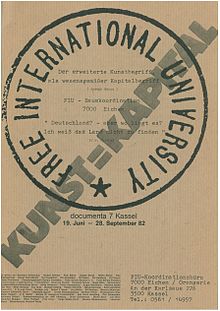Free International University

The Free International University (FIU), was a support organization founded by the German artist Joseph Beuys together with Klaus Staeck (1st chairman), Georg Meistermann (2nd chairman) and Willi Bongard (secretary), based on principles laid down in a manifesto written by Joseph Beuys and Heinrich Böll.[1] It was founded as a "organizational place of research, work, and communication" to ponder the future of society.[2] As a free University it was intended to supplement the state educational system while at the same time campaigning for legal equality with that system.[3]
The FIU was founded on 27 April 1973 in the Düsseldorf studio of Joseph Beuys and existed as a non-profit, recognized, and registered association up to its dissolution in 1988, more than two years after the death of the artist.[4]
The idea of the Free International University was revisited and taken further by various people and groups, including the author Rainer Rappmann under the FIU-Verlag and the F.I.U.s in Amsterdam, Antwerp, Gelsenkirchen, Hamburg, and Munich, which were begun by students of Beuys. They also include the organization Mehr Demokratie e.V.[5] and the Omnibus for direct Democracy.
See also
Citations
- ^ Joseph Beuys; Heinrich Böll (1973). "Manifesto on the foundation of a 'Free International School for Creativity and Interdisciplinary Research'", often referred to as "Manifesto for a Free International University", published in: Christos M. Joachimides and Norman Rosenthal, ed. (1974). Art into Society, Society into Art: Seven German Artists – Albrecht D., Joseph Beuys, K. P. Brehmer, Hans Haacke, Dieter Hacker, Gustav Metzger, Klaus Staeck. Institute of Contemporary Arts, London. pp. 49 ff.
{{cite book}}:|format=requires|url=(help), reprinted in: Joseph Beuys (1993). Carin Kuoni (ed.). Joseph Beuys in America: Energy Plan for the Western Man. Four Walls Eight Windows. pp. 149 ff. ISBN 978-1-56858-007-4. - ^ www.dreigliederung.de (First publication in: Frankfurter Rundschau, 23 December 1978)
- ^ Susanne Anna (Ed.): Joseph Beuys, Düsseldorf, Hatje Cantz, Stadtmuseum Düsseldorf, 29 September to 30. December 2007, Ostfildern 2008, 134
- ^ fiu-verlag.com FIU Informational brochure, published by the organization
- ^ www.mehr-demokratie.de Towards the birth of Mehr Demokratie e.V.
References
- Susanne Anna (Ed.): Joseph Beuys, Düsseldorf, Hatje Cantz, Stadtmuseum Düsseldorf, 29 September to 30. December 2007, Ostfildern 2008, ISBN 978-3-7757-1992-6
- Michael Ende and Joseph Beuys: Kunst und Politik - Ein Gespräch. FIU-Verlag, Wangen 1989, ISBN 3-928780-48-4
- Flensburger Hefte 24, 1789-1989 Direkte Demokratie. Interviews with Hans Peter Bull (SPD), Heiko Hoffmann (CDU), Gerald Häfner (Grüne), Joseph Beuys and Direkte Demokratie, das Kunstwerk Omnibus für Direkte Demokratie approx. 226 pages, 1989.
- Rainer Rappmann (Ed.): Denker, Künstler, Revolutionäre - Beuys, Dutschke, Schilinski, Schmundt - Vier Leben für Freiheit, Demokratie u. Sozialismus, Wangen 1996, FIU-Verlag, ISBN 3-928780-13-1
- Götz Adriani, Winfried Konnertz and Karin Thomas: Joseph Beuys; New printing, Cologne, DuMont (1994), ISBN 3-7701-3321-8
External links
- "FIU-timeline and further information". Archived from the original on 2011-09-10.
- Josephbeuysraum20.com - Photos of students in the class of Beuys from 1961–1978
- F.I.U.-Amsterdam & Free International University World Art Collection
- FIU-Munich
- Freie Kunstschule Hamburg FIU (Free Art School Hamburg FIU)
